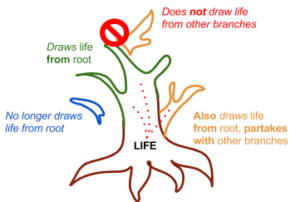- Who or What is the Olive Tree in Romans 11?, Pt.1
- Who or What is the Olive Tree in Romans 11 ?, Pt.2
- Who or What is the Olive Tree in Romans 11 ?, Pt.3
‘Replacement Theology” teaches God has no more plans for Israel & the church has ‘replaced’ them, but this is a doctrine that’s proved wrong by many bible passages one of them found in Romans 11 which tells us that God is not yet done with Israel, even they had rejected Him.
But on the opposite side of the coin we have another kind of ‘Replacement Theology’ were some teach that in order to be saved the ‘church’ needs to be part of Israel, (in other words the church is replaced by Israel). As one of their main points they use Romans 11, which they interpret that gentile believers are grafted into ‘Israel’, and for that reason have to become like them. But this is also wrong, to see it more clearly I’m sharing this next article that contains some nice illustrations:
“Grafting”
Written & illustrated by Brian R. Franco, used with permission
Preface
In Romans 11, Paul begins speaking to the Gentiles about their salvation, using the imagery of an olive tree and branches to explain the new life they are able to receive (and lose) with their belief (or lack thereof). The question, however, arises of “who or what is this olive tree the Gentiles are grafted into?” I’m going to present and attempt to defend the idea that Christ is the olive tree/root Gentiles are really grafted into. I’m going to do this by analyzing certain chapters, across the whole of Scripture, while explaining my understanding (with a fair amount of illustration to help visualize the ideas) of everything and how it ties together to form the basis for what I believe and why.
Romans 11
Defining Israel
The starting point for this exposition is Romans 11, which starts off as follows (I’ll be using the MEV translation for the most part, unless otherwise stated):
I say then, has God rejected His people? God forbid! For I also am an Israelite, a descendant of Abraham, of the tribe of Benjamin. God has not rejected His people whom He foreknew. Do you not know what the Scripture says of Elijah? How he pleads with God against Israel, saying, Lord, they have killed Your prophets and destroyed Your altars. I alone am left, and they seek my life”? But what is the divine reply to him? “I have kept for Myself seven thousand men, who have not bowed the knee to Baal.” So then at this present time there is a remnant according to the election of grace. And if by grace, then it is no longer by works; otherwise grace would no longer be grace. But if it is by works, then is it no longer by grace; otherwise work would no longer be work. What then? Israel has not obtained what it was seeking. But the elect obtained it, and the rest were hardened. vv.1 – 7
Paul had just finished explaining (in chapter 10) how the Gospel has come to save all mankind. Jew or Greek, it didn’t matter; those who call upon the name of the Lord would be saved. The end of the chapter quotes Isaiah 65:2 and points out that the nation of Israel was a “disobedient and contrary people.”
Paul clarifies, however, that this does not mean a complete abandonment of God’s people. Of course, as a self-identifying Israelite (a physical descendant of the tribe of Benjamin), Paul is not trying to say that the gift of salvation has been taken away from his brothers, as he himself was graciously revealed the truth, which we all know had a profound impact on his life.
He draws a parallel with how even Elijah thought he was the “only one” of his people that was still following the Lord, which God corrected by revealing that 7,000 other men had still not fallen to idolatry. Likewise, God’s grace has allowed some of His people (Israel) to “obtain” what they sought (as did Paul) while the rest suffered a greater consequence for their rejection of the Messiah:
As it is written: “God has given them a spirit of slumber, eyes that would not see and ears that would not hear, to this very day. And David says: “Let their table become a snare and a trap, a stumbling block and a retribution to them. Let their eyes be darkened, so that they may not see, and always bow down their backs.” vv.8 – 10
However, God does not allow His people to become blind out of malice, pleasure, or without cause. There was a bigger picture here, a plan:
I say then, have they stumbled that they should fall? God forbid! But through their transgression salvation has come to the Gentiles, to make them jealous. Now if their transgression means riches for the world, and their failure means riches for the Gentiles, how much more will their fullness mean? For I am speaking to you Gentiles. Inasmuch as I am the apostle to the Gentiles, I magnify my ministry, if somehow I may make my kinsmen jealous and may save some of them. For if their rejection means the reconciliation of the world, what will their acceptance mean but life from the dead? vv.11 – 15
The plan was to expand the gift of salvation from a limited group of people (Israel) to the world (v12). A fortunate side-effect this may have on some, is to spark a jealousy among the Jews, which would hopefully draw them back to their God and save them (v14).
Before continuing, I find it necessary to establish something from Paul’s intro, before continuing forward with the actual “tree portion” of the chapter. I think the context of Chapter 10’s ending and Chapter 11’s beginning gives us a picture of something Paul mentions back in Chapter 9 (verse 6), “For they are not all Israel who are descended from Israel.” There is a clear issue with Israel in that not everyone who is a physical Israelite is automatically a “child of the promise” (9:8), only a subset of these Israelites (the remnant) seem to partake in the blessings from their Father Abraham.
If the first portion of the dough (firstfruit) is holy, the batch is also holy. And if the root is holy, so are the branches. But if some of the branches were broken off, and you, being a wild olive shoot, were grafted in among them and became a partaker with them of the root and richness of the olive tree, do not boast against the branches. If you boast, remember you do not sustain the root, but the root sustains you. You will say then, “The branches were broken off, so that I might be grafted in.” This is correct. They were broken off because of unbelief, but you stand by faith. Do not be arrogant, but fear. For if God did not spare the natural branches, neither will He spare you. Therefore consider the goodness and severity of God—severity toward those who fell, but goodness toward you, if you continue in His goodness. Otherwise, you also will be cut off. vv. 16 – 22
We get one final bit of imagery before we start with the the tree, and it’s simply to show a sort of inheriting property that occurs here. Paul compares a portion of dough with its batch and parallels it to the root and its branches. The root, being holy, would naturally produce holy branches. It’s an interesting and undeniable property, despite the fact that this has no bearing on whether that branch remains holy, and possibly broken off (should it lose its holiness, I’d imagine). …
Editor’s Quote: The first piece of the dough (firstfruits) describes Jesus (1 Cor. 15:23.). The “lump” or “batch” refers to the believers.
The Olive Tree
Now we start with the plant-based metaphors. We must immediately establish the elements Paul conjures up here. First off, a root. This root is holy. We switch over to a new element, leaving the root still somewhat undefined. We have some branches, and they too are holy. However, these branches have apparently been broken off, and then Paul makes the connection with the Gentiles (his current targeted audience, v13) to being wild olive shoots who are apparently a distinct set of branches as well who were grafted in among the other (unbroken) branches. We can deduce from the earlier portion of the chapter that Paul is referencing the Jews as the other (original, natural, later on) branches. He warns the Gentiles not to boast against the Jews, because they (as branches) do not sustain the root, but vice versa. Although not directly stated, it seems quite clear that no branch sustains the root, the root sustains all the branches.
Paul goes back to what he had stated before about God’s people, Israel, receiving a sort of blindness to allow the Gentiles to rise. He parallels this by saying “the branches were broken off so that I [Gentiles] may be grafted in.” Now we must remember that it’s not as if God broke off all the branches to graft in the wild shoots. We are left with 3 types of branches:
The natural branch that remains, the natural branch that was broken off, and the wild branch that is grafted in among the first, partaking from the same root (which we’ve established, sustains all the branches). We can visualize this as so:
Now, I’ve summarized the characteristics of the elements in this chapter’s imagery to clarify some things. A natural question arises in that, being “natural” branches, wouldn’t they technically be the “same thing” as the root (i.e. why wouldn’t they be colored the same in the illustration above)? After all, a plum tree grows plum branches, and if you were going to graft a peach branch, you’d say you were grafting it into “the plum.” Similarly, it’s possible to conclude that, seeing as how Israel is the one branching out of the root, that the root is also Israel. However, I think it’s clear that the branches and root are completely different.
Root vs. Branches
For starters, we have the characteristics from the illustration above. The root:
1. Is holy (v16),
2. Is rich (v18),
3. Sustains (v18), and unlike the branches,
4. doesn’t seem to be breakable.
Admittedly, the first characteristic is shared. However, it’s important to point out the cause and effect here (which we’ll recall is stated in v16): the only reason the branches are holy, is because the root is holy. The branches don’t obtain any sort of holiness on their own; they derive it from the root. The root, as far as we can tell, simply is holy by nature. The root provides its richness to the branches and sustains them. The branches cannot sustain themselves or the root. Considering that the (natural) branches are Israel (be it the whole nation of which most is cut off, or the remaining “true” subset known as the remnant), then it wouldn’t make sense that Israel is sustaining itself. Not only that, but we can see that the branches can be (and are) removed for their unbelief. If, hypothetically, you were to remove all the natural branches, then that would mean none of Israel would be partaking in the richness and life of the root (which continues to provide these elements). Of course, that is not the case here, but the differences between Israel (branches) and the root are too much to consider them one and the same.
I believe Romans 9-11 paints a clear picture: the nation of Israel rejected God. Through his grace and mercy, God doesn’t flat out cut off all of Israel from the promises He made but rather allows a (temporary) blindness to come upon (most of) them so that He can continue his plan of bringing salvation to the world. The illustration Paul paints in chapter 11 should solely be taken from this context. It’s a way to visualize God’s chosen people being removed from this gift (which was originally given to them) because of their rejection of the Messiah, and God bringing in the rest of the world (Gentiles) to experience the richness of life that the root provides, should they follow Christ. Israel (physical or “true/spiritual”) does not provide life, nor salvation. I feel like this is sufficiently clear simply from the verses we can see in Romans 11. However, it’s worth analyzing other portions of Scripture to see what they say. One of the obvious go-to’s is all the way back in Jeremiah, where we see yet another olive tree.
Continues . . ( Part 2)


